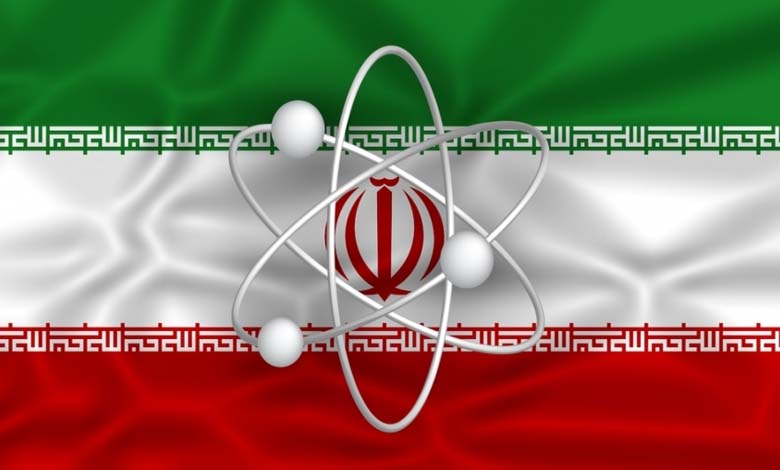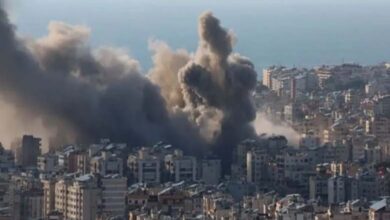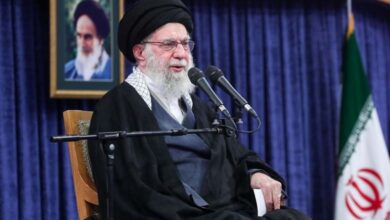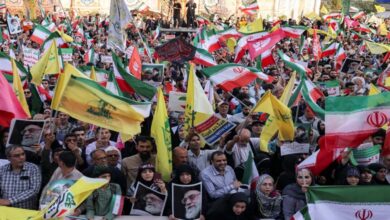Iran’s Nuclear Program: What is the “Wisest” Path for the U.S. to Face It?

With Iran threatening to change its nuclear doctrine to allow for the production of nuclear weapons, questions have arisen in American circles regarding the “wisest” course of action in dealing with Tehran’s ambitions.
-
“Surprise” in Israeli Attack on Iran: Advance Warning of Date and Targets?
-
How is Iran preparing to respond to Israel? An American newspaper reveals the details
Kamal Kharrazi, an advisor to Iranian Supreme Leader Ali Khamenei, suggested on Friday that Tehran would have no difficulty changing its nuclear doctrine in the face of an existential threat, noting that Tehran “possesses the technical capabilities necessary for producing nuclear weapons, and the fatwa from the Supreme Leader is the only thing preventing it.”
A fatwa prohibiting the production and use of nuclear weapons was issued by Supreme Leader Khamenei in 2003, and two years later, the Iranian government officially announced it at a meeting of the International Atomic Energy Agency in Vienna.
-
Iran Prepares for Military Response to Potential Israeli Attack Amid Warnings of Widespread Escalation
-
Iranian Spy Network Dismantled: Serious Security Implications of Escalation between Tehran and Tel Aviv
What is the “best” course for America to pursue?
American academic Andrew Latham, in an article in The Hill, argues that with the advancement of Iran’s nuclear ambitions and the escalation of regional tensions, recent Israeli strikes against Iranian air defenses and ballistic missile production facilities have confirmed that Tehran’s vulnerabilities are “real,” and that a carefully considered approach of restraint, along with limited military action, “can effectively contain Iran’s ambitions.”
While the United States and Israel share concerns about Iran’s acquisition of nuclear weapons, which pose an “existential threat to the Jewish state,” Washington is cautious, fearing entanglement in yet another prolonged conflict in the Middle East, adds the American academic.
-
Iran Complains to the International Atomic Energy Agency About Israel
-
Iran explicitly warns the U.S. of the consequences of supporting an Israeli attack on it
He noted that recent Israeli strikes provide a “useful model” aligned with American strategic interests: precise and constrained actions that effectively disrupt Iranian activities without escalating into broader acts of aggression.
He warned that the risks associated with a comprehensive confrontation with Iran are “well-known”; a comprehensive strike on Iran’s nuclear infrastructure could provoke Iran’s extensive network of regional agents — including Hezbollah in Lebanon, Shiite militias in Iraq, and the Houthis in Yemen — which could lead to widespread retaliatory actions against both Israeli and American interests.
-
No Ceasefire in Gaza until De-escalation between Iran and Israel
-
Iranian Parliament Speaker: “The Main Pillar of the Lebanese People is Leader Ali Khamenei!”
Such an escalation could “destabilize the Middle East and encourage extremists within Iran to accelerate the nuclear program that Israel and the U.S. are trying to contain,” according to the senior researcher at the Institute for Peace and Diplomacy.
The “Wisest” Path
According to Andrew Latham, recent Israeli operations provide a model for this approach: targeted strikes that indicate Israeli red lines without triggering a total war, asserting that by focusing on specific military assets, Israel sends a clear message about the limits it is willing to impose.
-
Leaks Reveal Israeli Preparations to Strike Iran and U.S. Concerns
-
Iran Faces a Dilemma… Who Will Be the Successor to Hezbollah?
For the U.S., supporting the limited actions undertaken by Israel while expanding regional partnerships in missile defense and intelligence sharing offers a solid framework for maintaining deterrence.
This approach incorporates economic pressures as a key element; targeted sanctions against Iran’s Revolutionary Guard Corps and its nuclear sector “continue to deplete resources that could have been used to finance Tehran’s nuclear ambitions,” according to the American academic, who asserts that this “pressure without provocation” approach is particularly effective when the U.S. coordinates with its European allies to impose sanctions stringently.
-
Missile Defense: Iran or Russia? Ukraine Angered by Israel’s “Special Treatment”
-
Details of Iran’s “Recruitment” of an Israeli and His Girlfriend to Carry Out an “Assassination” Operation
He emphasized that “strengthening the enforcement of sanctions, combined with occasional Israeli military operations, would increase pressure on Iran, signaling that its nuclear initiatives will be met with resistance on multiple fronts.”
This pressure must coincide with diplomatic efforts, through a unified stance from the U.S. European allies and regional actors, which could “isolate Tehran” and send it the message that “while diplomatic avenues may remain open, its ambitions will be limited by a cohesive international front,” says an international relations professor at Macalester College in Minnesota.
-
Iranian MiG-29s: Can they fend off the impending Israeli attack?
-
Iran Investigates Qaani Amid Suspicions of His Office Manager’s Espionage for Israel
At the same time, “Israel and the U.S. must clarify their red lines without provoking unnecessary escalation, reaffirming their defensive commitment.”
By clearly defining that defensive actions will only be taken in response to Iranian provocations, Israel and the U.S. can maintain a strong deterrent position without risking misunderstanding, says the American academic, emphasizing that “rushing into war is neither necessary nor wise.”
-
Iran Threatens Gulf States with Retaliation If They Support an Attack on It
-
Will Iran Abandon Hezbollah for Its Regional Interests?
He noted that recent Israeli strikes against Iran demonstrate that “Tehran’s ambitions can be effectively contained without plunging the region into war, through a thoughtful and balanced approach that combines strategic restraint and limited military actions from time to time to reinforce red lines.”
He added that this path of “strategic restraint, complemented by carefully chosen actions, is not a sign of weakness but an evolved and sustainable response that maximizes pressure on Iran while maintaining regional stability.”
-
In Case of an Israeli Attack: Source Discusses Iran’s Plan and Target Bank
-
Iranian Missiles on Israel: Launch and Interception Costs
Another Viewpoint
Former U.S. military officer Dan Neidis, in an article in the same journal, states that the U.S. has not taken actions nor even confirmed what it is willing to do to prevent Iran from acquiring a nuclear weapon in recent months.
He specified that “taking decisive action is not something the current U.S. administration has built a good reputation on,” but following this path “is what the moment demands. And there has not been a better opportunity than this one.”
-
Iran’s Attack on Israel: “A Gamble” or “A Trap”?
-
“Telegraph”: Iran May Feel That Building a Nuclear Bomb Is Its Only Option Now
The former U.S. military officer compared the situation in North Korea to that of Iran, noting that while U.S. administrations have failed to convince Pyongyang to abandon its nuclear ambitions, the Biden administration is treading the same path.
The armament programs of both countries have emerged from seemingly peaceful nuclear projects that they were allowed to pursue. Each accepted guarantees and inspections from the International Atomic Energy Agency.
-
How did Iranian missiles breach Israel’s “Dome”? 4 Reasons
-
Iran attempts to move thousands of militants to border areas between Syria and Lebanon… Why?
In September 2005, North Korea agreed to restore the agency’s protocols and suspend its nuclear programs. This earned it the approval of the U.S., South Korea, and Japan, while the Iranian president is currently trying to do the same.
The former U.S. military officer called for the “destruction of Iran’s nuclear capabilities,” asserting that this is “the last chance we have and it is slipping away from us.”












